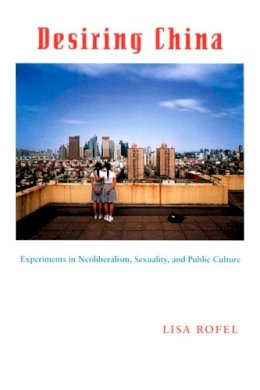
Desiring China: Experiments in Neoliberalism, Sexuality, and Public Culture
Lisa Rofel
Drawing on her research over the past two decades among urban residents and rural migrants in Hangzhou and Beijing, Rofel analyzes the meanings that individuals attach to various public cultural phenomena and what their interpretations say about their understandings of post-socialist China and their roles within it. She locates the first broad-based public debate about post-Mao social changes in the passionate dialogues about the popular 1991 television soap opera Yearnings. She describes how the emergence of gay identities and practices in China reveals connections to a transnational network of lesbians and gay men at the same time that it brings urban/rural and class divisions to the fore. The 1999–2001 negotiations over China’s entry into the World Trade Organization; a controversial women’s museum; the ways that young single women portray their longings in relation to the privations they imagine their mothers experienced; adjudications of the limits of self-interest in court cases related to homoerotic desire, intellectual property, and consumer fraud—Rofel reveals all of these as sites where desiring subjects come into being.
Product Details
About Lisa Rofel
Reviews for Desiring China: Experiments in Neoliberalism, Sexuality, and Public Culture
Patti Duncan
NWSA Journal
“Desiring China will surely take its place as an indispensable work that scholars in queer studies, cultural studies, and Chinese studies have been ‘desiring’ for a long time.”
Alvin Ka Hin Wong
GLQ
“Lisa Rofel’s volume is distinguished by its explicit engagement with U. S. politics through an extensive examination of China-in-transformation. Rofel’s analysis centers on public cultural spheres and foregrounds the thesis that globalization is no longer external to China but internal to its economic and cultural productions of commodities, public spheres, subjectivities, and desire.”
Yan Hairong
Journal of Asian Studies
“This book is theoretically expansive and ethnographically rich, weaving discussions of the production of post-socialist subjectivities with critiques of the literature on ‘neoliberalism.’ It should be welcomed by a wide range of scholars who have an interest in cultural studies, China and Asian studies, queer and feminist theory, and contemporary theory.”
Tiantian Zheng
The China Quarterly
